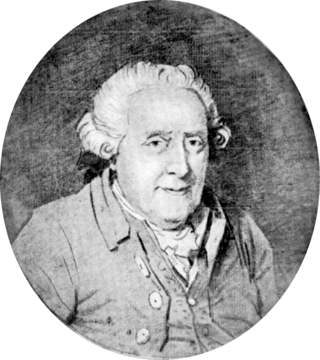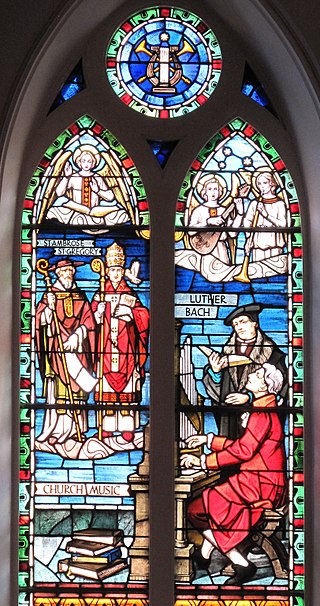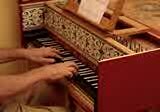See also
Name list
This page or section lists people that share the same given name. If an internal link led you here, you may wish to change that link to point directly to the intended article.
| Gender | male |
|---|---|
| Origin | |
| Meaning | peace-man |
| Other names | |
| Related names | Friedmann, Friedman |
Friedemann is a German given name meaning "peace man".
Friedemann (surname)

Wilhelm Friedemann Bach was a German composer, organist and harpsichordist. He was the second child and eldest son of Johann Sebastian Bach and Maria Barbara Bach. Despite his acknowledged genius as an improviser and composer, his income and employment were unstable, and he died in poverty.

The Bach family refers to several notable composers of the baroque and classical periods of music, the best-known of whom was Johann Sebastian Bach (1685–1750). A family genealogy was drawn up by Johann Sebastian Bach himself in 1735 when he was 50 and was completed by his son Carl Philipp Emanuel.

Gustaf Gründgens, born Gustav Heinrich Arnold Gründgens, was one of Germany's most famous and influential actors of the 20th century, and artistic director of theatres in Berlin, Düsseldorf, and Hamburg. His career continued unimpeded through the years of the Nazi regime; the extent to which this can be considered as deliberate collaboration with the Nazis is hotly disputed.

X is the tenth album by Klaus Schulze. It was originally released in 1978, and in 2005 was the fifth Schulze album reissued by Revisited Records.

Klavierbüchlein für Wilhelm Friedemann Bach is a collection of keyboard music compiled by the German Baroque composer Johann Sebastian Bach for his eldest son Wilhelm Friedemann. It is frequently referred to simply as Klavierbüchlein.
WFB is an initialism and may refer to:

The Chronicle of Anna Magdalena Bach is a 1968 film by the French filmmaking duo of Jean-Marie Straub and Danièle Huillet. It was their first full-length feature film, and reportedly took a decade to finance. The film stars renowned harpsichordist Gustav Leonhardt as Johann Sebastian Bach and Christiane Lang as Anna Magdalena Bach. The orchestral music was performed by Concentus Musicus and conducted by Nikolaus Harnoncourt. It is the first of several Straub-Huillet films to be based on works of classical music. The film was entered into the 18th Berlin International Film Festival.

Ein feste Burg ist unser Gott, BWV 80, is a chorale cantata for Reformation Day by Johann Sebastian Bach. He reworked it from one of his Weimar cantatas, Alles, was von Gott geboren, BWV 80a. The first Leipzig version of the church cantata, BWV 80b, may have been composed as early as 1723, some five months after Bach had moved to Leipzig. Some years later he reworked the cantata one more time, writing an extended chorale fantasia as its opening movement. The text of the BWV 80a version was written by Salomon Franck and contained one stanza of Martin Luther's hymn "Ein feste Burg ist unser Gott"; for his chorale cantata versions, BWV 80b and 80, Bach added the complete text of this Lutheran hymn.
Bach is a surname of German-language origin. Notable people with the surname include:
Mein Name ist Bach is a 2003 Swiss film directed by Dominique de Rivaz. The premiere took place within the framework of the 56th Locarno Film Festival, which was held from August 6 to August 16, 2003. It was Switzerland's submission to the 77th Academy Awards for the Academy Award for Best Foreign Language Film, but was not accepted as a nominee.

Friedemann Bach is a 1941 German historical drama film directed by Traugott Müller and starring Gustaf Gründgens, Leny Marenbach and Johannes Riemann. The film depicts the life of Johann Sebastian Bach's son Wilhelm Friedemann Bach. It is based on Albert Emil Brachvogel's novel Friedemann Bach. Wilhelm Friedemann Bach is shown as a gifted son trying to escape his father's shadow.
Klaus Mertens is a German bass and bass-baritone singer who is known especially for his interpretation of the complete works of Johann Sebastian Bach for bass voice.

L'arpa festante is a German chamber orchestra, specializing in the revival and performance of unknown works, especially from the Baroque era. It was established in Munich in 1983 by Michi Gaigg, who also led the ensemble as concertmaster until 1995. The ensemble takes its name from Giovanni Battista Maccioni's dramatic cantata L'arpa festante which was first performed in 1653, inaugurating what was to become the Bavarian State Opera.
Leny Marenbach was a German film actress. She was a leading German actress of the Nazi era, appearing in films such as the biopic Friedemann Bach. After the Second World War, she appeared in several DEFA roles.
The Orchestral Suite in G minor, BWV 1070 is a work by an unknown composer. It is part of the Bach-Werke-Verzeichnis catalogue of the works of Johann Sebastian Bach, and sometimes called the "Orchestral Suite No. 5", but was almost certainly not composed by him. It is more likely that the composer was his son Wilhelm Friedemann Bach. It is a French suite with an overture and several dances, which has a similar structure to the 4 orchestral suites known to have been written by J. S. Bach. Evidence for its not being by the older composer includes the form of the opening movement, which differs from that used in the suites known to be by him, and the fact that the third movement is in a different key to the rest of the work, whereas J. S. Bach's suites are homotonal.

Twelve Little Preludes, BWV 924–930, 939–942 and 999, is a 19th-century compilation of short pieces, collected from various 18th-century manuscripts written by Johann Sebastian Bach and others. Notwithstanding their diverse origin and characteristics, they were published as a set of twelve keyboard preludes by Bach in, amongst others, the 36th volume of the Bach-Gesellschaft Ausgabe (BGA).
Prelude and Fugue in E minor, BWV 855, is the 10th prelude and fugue for keyboard (harpsichord) in the first book of The Well Tempered Clavier, composed in 1722 by Johann Sebastian Bach. The Prelude in E minor, BWV 855a, features as No. 18 ("Praeludium 5") in the 1720 Klavierbüchlein für Wilhelm Friedemann Bach. BWV 855a may also refer to both this Prelude and a Fughetta in the same key, an early version of BWV 855. Alexander Siloti made a piano arrangement in B minor of the Prelude BWV 855a.
A missa brevis is a shorter musical mass composition.

The Wilhelm Friedemann Bach House is a cultural site in Halle in Saxony-Anhalt, Germany. The composer Wilhelm Friedemann Bach (1710–1784), eldest son of Johann Sebastian Bach, lived here during part of his career; the building now has an exhibition about W. F. Bach and other composers who lived in Halle.
The Rheinische Kantorei is a German vocal ensemble of baroque music accompanied by an instrumental ensemble called Das Kleine Konzert.